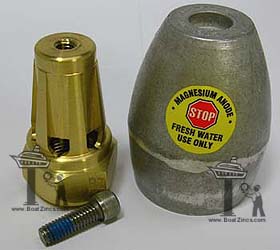charlg
New Member
- Jan 7, 2007
- 745
- Boat Info
- 2000 280 Sun Sport
/ Raymarine C80 w/ Radar / Sirius weather
/ SH GX5000S VHF
- Engines
- Twin 350 Mags / B1's
/ Corsa exhaust
Am I in trouble here? All of a sudden, I'm noticing what looks like corrosion. I am slipped in fresh water and the boat comes out of the water frequently to take trips. I've never noticed this until a month ago. Since then, it seems to be geting worse. I replaced the anodes at the beginning of the season.
If it is corrosion, what can I do to stop any further damage? Sand / paint?
I know there is an inherent problem with the BIII and corrosion. Do I have one of the problem years? Should I contact Merc?
Thank you.
If it is corrosion, what can I do to stop any further damage? Sand / paint?
I know there is an inherent problem with the BIII and corrosion. Do I have one of the problem years? Should I contact Merc?
Thank you.






